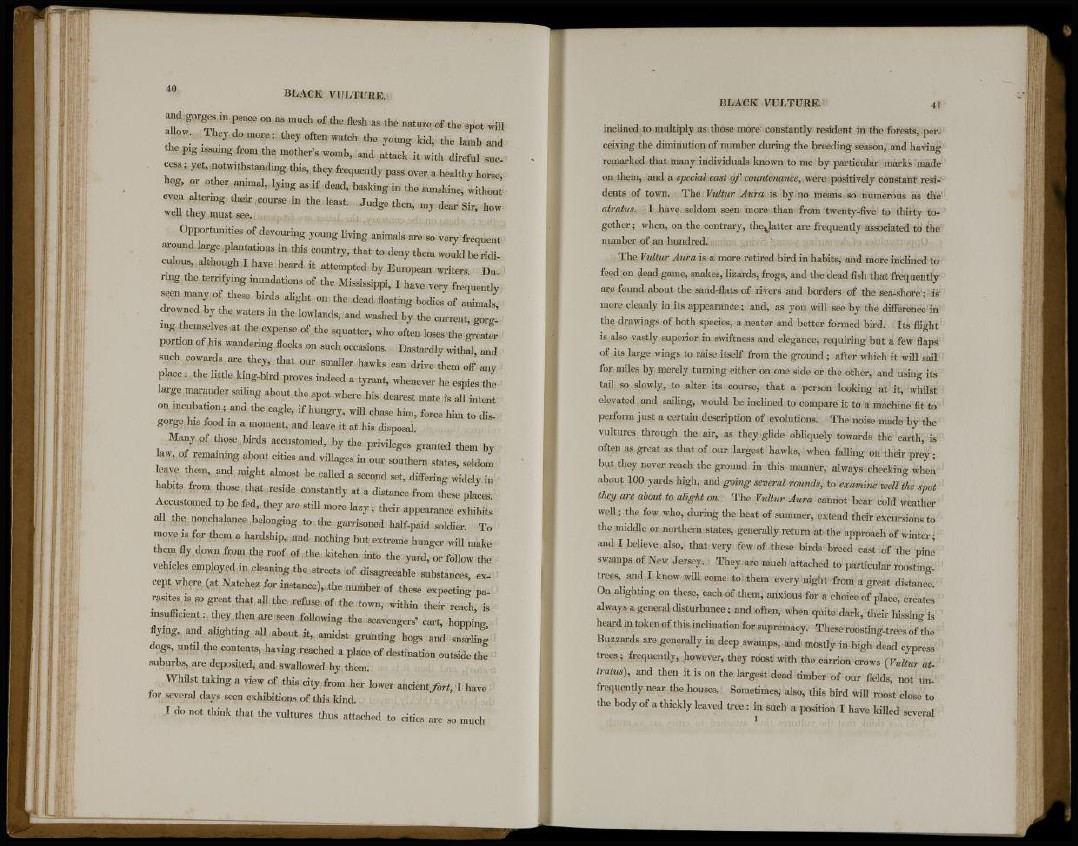
and gorges in peace on as much of the flesh as the nature of the spot will
allow. They do more: they often watch the young kid, the lamb and
the pig issuing from the mother's womb, and attack it with direful success
; yet, notwithstanding this, they frequently pass over a healthy horse,
hog, or other animal, lying as if dead, basking in the sunshine, without
even altering their course in the least. Judge then, my dear Sir, how
well they must see.
Opportunities of devouring young living animals are so very frequent
around large plantations in this country, that to deny them would be ridiculous,
although I have heard it attempted by European writers. During
the terrifying inundations of the Mississippi, I have very frequently
seen many of these birds alight on the dead floating bodies of animals,
drowned by the waters in the lowlands, and washed by the current, gorging
themselves at the expense of the squatter, who often loses the greater
portion of his wandering flocks on sueh occasions. Dastardly withal, and
such cowards are they, that our smaller hawks can drive them off any
place: the little king-bird proves indeed a tyrant, whenever he espies the
large marauder sailing about the spot where his dearest mate is all intent
on incubation; and the eagle, if hungry, will chase him, force him to disgorge
his food in a moment, and leave it at his disposal.
Many of those birds accustomed, by the privileges granted them by
law, of remaining about cities and villages in our southern states, seldom
leave them, and might almost be called a second set, differing widely in
habits from those that reside constantly at a distance from these places.
Accustomed to be fed, they are still more lazy ; their appearance exhibits
all the nonchalance belonging to the garrisoned half-paid soldier. To
move is for them a hardship, and nothing but extreme hunger will make
them fly down from the roof of the kitchen into the yard, or follow the
vehicles employed in cleaning the streets of disagreeable substances, except
where (at Natchez for instance), the number of these expecting parasites
is so great that all the refuse of the town, within their reach, is
insufficient: they then are seen.following the scavengers' cart, hopping,
flying, and alighting all about it, amidst grunting hogs and snarling
dogs, until the contents, having reached a place of destination outside the
suburbs, are deposited, and swallowed by them.
Whilst taking a view of this city from her lower ancientjfórtf, I have
for several days seen exhibitions of this kind.
I do not think that the vultures thus attached to cities are so much
inclined to multiply as those more constantly resident in the forests, perceiving
the diminution of number during the breeding season, and ha vinoremarked
that many individuals known to me by particular marks made
on them, and a special cast of countenance, were positively constant residents
of town. The Vultur Aura is by no means so numerous as the
atratus. I have seldom seen more than from twenty-five to thirty together
; when, on the contrary, the^latter are frequently associated to the
number of an hundred.
The Vultur Aura is a more retired bird in habits, and more inclined to
feed on dead game, snakes, lizards, frogs, and the dead fish that frequently
are found about the sand-flats of rivers and borders of the sea-shore; is
more cleanly in its appearance; and, as you will see by the difference in
the drawings of both species, a neater and better formed bird. Its flight
is also vastly superior in swiftness and elegance, requiring but a few flaps
of its large wings to raise itself from the ground; after which it will sail
for miles by merely turning either on one side or the other, and using its
tail so slowly, to alter its course, that a person looking at it, whilst
elevated and sailing, would be inclined to compare it to a machine fit to
perform just a certain description of evolutions. The noise made by the
vultures through the air, as they glide obliquely towards the earth, is
often as great as that of our largest hawks, when falling on their prey;
but they never reach the ground in this manner, always checking when
about 100 yards high, and going several rounds, to examine well the spot
they are about to alight on. The Vultur Aura cannot bear cold weather
well; the few who, during the heat of summer, extend their excursions to
the middle or northern states, generally return at the approach of winter;
and I believe also, that very few of these birds breed east of the pine
swamps of New Jersey. They are much attached to particular roosting,
trees, and I know will come to them every night from a great distance.
On alighting on these, each of them, anxious for a choice of place, creates
always a general disturbance ; and often, when quite dark, their hissing is
heard in token of this inclination for supremacy. These roosting-trees of the
Buzzards are generally in deep swamps, and mostly in high dead cypress
trees; frequently, however, they roost with the carrion crows (Vultur aU
trains), and then it is on the largest dead timber of our fields, not unfrequently
near the houses. Sometimes, also, this bird will roost close to
the body of a thickly leaved tree: in such a position I have killed several